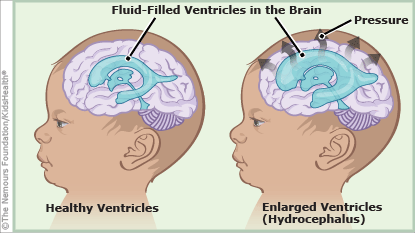Countdown to Washington: 3 weeks and four (4) days
I. What is hydrocephalus?
 |
| Taken shortly after my birth, my hydrocephalus was clearly evident |
After completing my latest blog last night, it occurred to me that some might not know and/or understand what hydrocephalus is. It is a condition caused by an abnormal accumulation of cerebrospinal fluid (CSF) in the ventricles (pictured above) of the brain. The word comes from the Greek hydro (meaning "water") and cephalus (meaning "head). Often, the term "water head" is used in a derogatory sense to make fun of a person suffering from the condition.
Under normal conditions the CSF - which is produced in the ventricles - circulates through the ventricular system before being absorbed into the blood stream. It is constantly being circulated and serves many functions in ensuring the health of both the brain and the spinal cord. Perhaps one of its most important functions is to surround both the brain and spinal cord and serve as a cushion against injury. In persons with hydrocephalus (or "hydro" for short) there is an imbalance between the amount of CSF produced and the rate at which it is absorbed into the blood stream. As it builds up within the ventricles, it causes them to enlarge and the pressure to increase.
II. What causes hydrocephalus?
First of all, it's important to differentiate that hydrocephalus is a condition and not a disease (emphasis added) as I have heard people mistakenly say over the years. It can develop for a variety of reasons including as a part of another condition.
Hydrocephalus that is congenital (meaning that it is present at birth as mine was) is thought to be the result of a complex interaction of both genetic and environmental factors. One of the most common causes of hydrocephalus is Aqueductal stenosis where there is a blockage of the cerebral aqueduct known as the Aqueduct of Sylvius. It is estimated that hydrocephalus occurs in 1.5 per 1,000 births.
In addition to congenital hydrocephalus, it can also be acquired as the result of intraventricular hemorrhage, meningitis, head trauma, a tumor, or a cyst.
Yet a third cause of hydrocephalus - known as normal pressure hydrocephalus or NPH - is prevalent in older adults. Unlike congenital or acquired hydrocephalus, NPH causes little or no appreciable increase in pressure within the ventricles.
For additional information: Hydrocephalus fact sheet


No comments:
Post a Comment